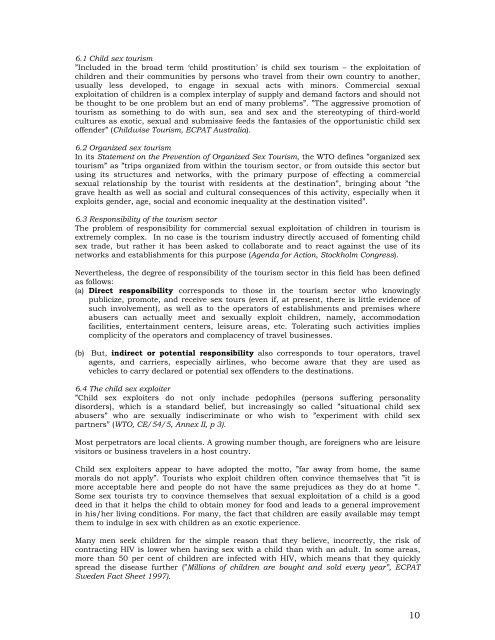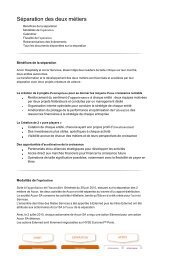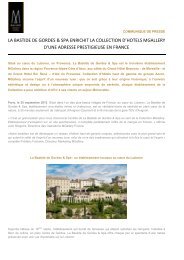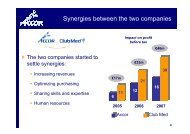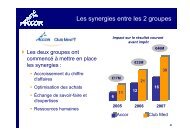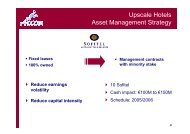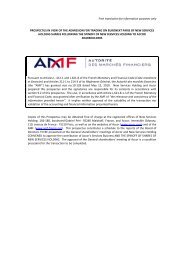Code of Conduct for the Protection of Children from Sexual ...
Code of Conduct for the Protection of Children from Sexual ...
Code of Conduct for the Protection of Children from Sexual ...
Create successful ePaper yourself
Turn your PDF publications into a flip-book with our unique Google optimized e-Paper software.
6.1 Child sex tourism<br />
”Included in <strong>the</strong> broad term ‘child prostitution’ is child sex tourism – <strong>the</strong> exploitation <strong>of</strong><br />
children and <strong>the</strong>ir communities by persons who travel <strong>from</strong> <strong>the</strong>ir own country to ano<strong>the</strong>r,<br />
usually less developed, to engage in sexual acts with minors. Commercial sexual<br />
exploitation <strong>of</strong> children is a complex interplay <strong>of</strong> supply and demand factors and should not<br />
be thought to be one problem but an end <strong>of</strong> many problems”. ”The aggressive promotion <strong>of</strong><br />
tourism as something to do with sun, sea and sex and <strong>the</strong> stereotyping <strong>of</strong> third-world<br />
cultures as exotic, sexual and submissive feeds <strong>the</strong> fantasies <strong>of</strong> <strong>the</strong> opportunistic child sex<br />
<strong>of</strong>fender” (Childwise Tourism, ECPAT Australia).<br />
6.2 Organized sex tourism<br />
In its Statement on <strong>the</strong> Prevention <strong>of</strong> Organized Sex Tourism, <strong>the</strong> WTO defines ”organized sex<br />
tourism” as ”trips organized <strong>from</strong> within <strong>the</strong> tourism sector, or <strong>from</strong> outside this sector but<br />
using its structures and networks, with <strong>the</strong> primary purpose <strong>of</strong> effecting a commercial<br />
sexual relationship by <strong>the</strong> tourist with residents at <strong>the</strong> destination”, bringing about ”<strong>the</strong><br />
grave health as well as social and cultural consequences <strong>of</strong> this activity, especially when it<br />
exploits gender, age, social and economic inequality at <strong>the</strong> destination visited”.<br />
6.3 Responsibility <strong>of</strong> <strong>the</strong> tourism sector<br />
The problem <strong>of</strong> responsibility <strong>for</strong> commercial sexual exploitation <strong>of</strong> children in tourism is<br />
extremely complex. In no case is <strong>the</strong> tourism industry directly accused <strong>of</strong> fomenting child<br />
sex trade, but ra<strong>the</strong>r it has been asked to collaborate and to react against <strong>the</strong> use <strong>of</strong> its<br />
networks and establishments <strong>for</strong> this purpose (Agenda <strong>for</strong> Action, Stockholm Congress).<br />
Never<strong>the</strong>less, <strong>the</strong> degree <strong>of</strong> responsibility <strong>of</strong> <strong>the</strong> tourism sector in this field has been defined<br />
as follows:<br />
(a) Direct responsibility corresponds to those in <strong>the</strong> tourism sector who knowingly<br />
publicize, promote, and receive sex tours (even if, at present, <strong>the</strong>re is little evidence <strong>of</strong><br />
such involvement), as well as to <strong>the</strong> operators <strong>of</strong> establishments and premises where<br />
abusers can actually meet and sexually exploit children, namely, accommodation<br />
facilities, entertainment centers, leisure areas, etc. Tolerating such activities implies<br />
complicity <strong>of</strong> <strong>the</strong> operators and complacency <strong>of</strong> travel businesses.<br />
(b) But, indirect or potential responsibility also corresponds to tour operators, travel<br />
agents, and carriers, especially airlines, who become aware that <strong>the</strong>y are used as<br />
vehicles to carry declared or potential sex <strong>of</strong>fenders to <strong>the</strong> destinations.<br />
6.4 The child sex exploiter<br />
”Child sex exploiters do not only include pedophiles (persons suffering personality<br />
disorders), which is a standard belief, but increasingly so called ”situational child sex<br />
abusers” who are sexually indiscriminate or who wish to ”experiment with child sex<br />
partners” (WTO, CE/54/5, Annex II, p 3).<br />
Most perpetrators are local clients. A growing number though, are <strong>for</strong>eigners who are leisure<br />
visitors or business travelers in a host country.<br />
Child sex exploiters appear to have adopted <strong>the</strong> motto, ”far away <strong>from</strong> home, <strong>the</strong> same<br />
morals do not apply”. Tourists who exploit children <strong>of</strong>ten convince <strong>the</strong>mselves that ”it is<br />
more acceptable here and people do not have <strong>the</strong> same prejudices as <strong>the</strong>y do at home ”.<br />
Some sex tourists try to convince <strong>the</strong>mselves that sexual exploitation <strong>of</strong> a child is a good<br />
deed in that it helps <strong>the</strong> child to obtain money <strong>for</strong> food and leads to a general improvement<br />
in his/her living conditions. For many, <strong>the</strong> fact that children are easily available may tempt<br />
<strong>the</strong>m to indulge in sex with children as an exotic experience.<br />
Many men seek children <strong>for</strong> <strong>the</strong> simple reason that <strong>the</strong>y believe, incorrectly, <strong>the</strong> risk <strong>of</strong><br />
contracting HIV is lower when having sex with a child than with an adult. In some areas,<br />
more than 50 per cent <strong>of</strong> children are infected with HIV, which means that <strong>the</strong>y quickly<br />
spread <strong>the</strong> disease fur<strong>the</strong>r (”Millions <strong>of</strong> children are bought and sold every year”, ECPAT<br />
Sweden Fact Sheet 1997).<br />
10


